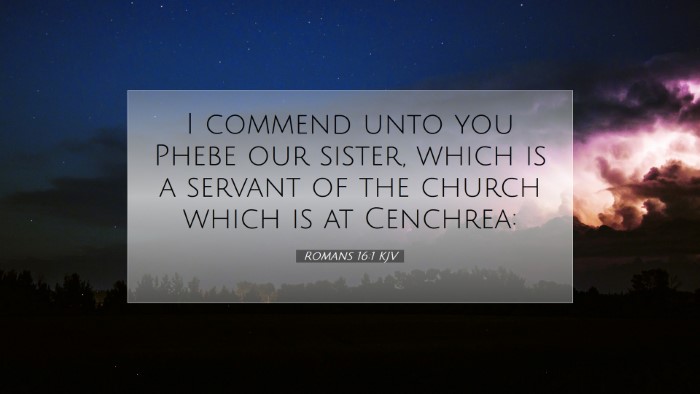Romans 16:1 - Commentary Overview
Romans 16:1 states: "I commend unto you Phoebe our sister, which is a servant of the church which is at Cenchrea:"
This verse serves as a transition into the concluding remarks of Paul's epistle to the Romans. It highlights the role of Phoebe within the early church and sets a precedent for recognizing the contributions of women in ministry.
Context and Significance
The apostle Paul, known for his missionary journeys and theological teachings, often acknowledged individuals who contributed to the spread of the Gospel. In Romans 16:1, he introduces Phoebe, suggesting her vital role in the early Christian community at Cenchrea, a port of Corinth.
Commendation of Phoebe
Paul commends Phoebe, emphasizing her importance. Matthew Henry elaborates on this, noting that commendations strengthen fellowship within the body of Christ and give recognition to faithful servants.
- Purpose of Commendation: To seek the church's support for Phoebe as she likely delivers the epistle to Rome.
- Moral Support: Encouraging the Roman believers to receive her warmly as someone Paul trusts.
Role as a Deaconess
The term "servant," as used in this verse, is translated from the Greek word diakonos, suggesting that Phoebe held a formal role as a deaconess. Adam Clarke points out that this office indicates her active involvement in the church, possibly in ministry or benevolence works.
Theological Implications
The inclusion of Phoebe in this epistle carries profound theological implications, particularly regarding the role of women in ministry. Paul’s acknowledgment challenges traditional views about gender roles within the church and affirms the participation of women in leadership and service.
- Equity in Ministry: It reflects an early understanding of shared ministry responsibilities beyond male leadership.
- Diversity in Service: Recognizes various roles within the body of Christ, calling both men and women to serve.
Historical and Cultural Context
In the first-century Greco-Roman society, women often faced limitations concerning public roles. However, the early church began to disrupt these norms, allowing women like Phoebe to hold positions of influence. Albert Barnes indicates that her service was a testimony to the growing acceptance of women within the faith community, showcasing how the Gospel transcends societal boundaries.
Implications for the Church Today
The mention of Phoebe invites modern churches to reflect on their practices and attitudes toward women's roles in ministry. Understanding the value of Phoebe's commendation can inspire congregations to embrace diverse leadership models and encourage all believers to utilize their gifts in service of the church.
Practical Lessons
From Romans 16:1, several practical lessons emerge for contemporary believers and church leaders:
- Encouragement of Others: Following Paul's example, believers should actively commend and encourage fellow servants in their ministries.
- Recognition of Contributions: It is vital to acknowledge the contributions of all members of the church, regardless of gender.
- Responsibility in Service: Believers are called to serve one another, fulfilling the ministry in unity and diversity.
Conclusion
Romans 16:1 not only serves as an introduction to the final chapter of Paul's letter but also enriches our understanding of the early church dynamics and challenges the norms of its time. Through the commendation of Phoebe, believers today are encouraged to embrace a holistic view of ministry that appreciates the contributions of every member, fostering a culture of honor and respect for all whom God calls to serve.


